| Listing 1 - 10 of 15 | << page >> |
Sort by
|
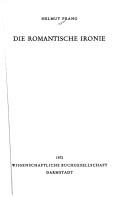
ISBN: 3534054040 9783534054046 Year: 1972 Volume: 12 Publisher: Darmstadt: Wissenschaftliche Buchgesellschaft,
Abstract | Keywords | Export | Availability | Bookmark
 Loading...
Loading...Choose an application
- Reference Manager
- EndNote
- RefWorks (Direct export to RefWorks)
Irony. --- Irony --- German literature --- Thematology --- anno 1800-1899 --- Romanticism --- Sarcasm --- Cynicism --- Rhetoric --- Satire --- Tragic, The --- Understatement --- Romantisme --- Ironie --- Romanticism - Germany
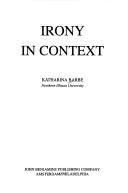
ISBN: 9027250464 1556193270 9027282706 1283222078 9786613222077 9789027282705 9789027250469 9781556193279 Year: 1995 Volume: n.s., 34 Publisher: Amsterdam: Benjamins,
Abstract | Keywords | Export | Availability | Bookmark
 Loading...
Loading...Choose an application
- Reference Manager
- EndNote
- RefWorks (Direct export to RefWorks)
In her book, Barbe discusses verbal irony as an interpretative notion. Verbal irony is described in its various realizations and thus placed within linguistics and pragmatics. From the point of view of an analyzing observer, Barbe provides an eclectic approach to irony in context, a study of how conversational irony works, and how it compares with other concepts in which it plays a role. In addition, by means of the analysis of irony as an integrated pervasive feature of language, Barbe questions some basic unstated, literacy and culture-dependent assumptions about language. Her study of irony
Literary semiotics --- Pragmatics --- Irony in literature --- Irony in literature. --- Irony. --- Irony --- Ironie --- Ironie dans la littérature --- Sarcasm --- Cynicism --- Rhetoric --- Satire --- Tragic, The --- Understatement --- Ironie dans la litterature
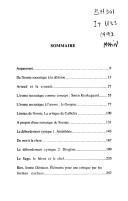
ISBN: 2251604847 9782251604848 Year: 1993 Volume: 5 484 Publisher: Paris: Les Belles Lettres,
Abstract | Keywords | Export | Availability | Bookmark
 Loading...
Loading...Choose an application
- Reference Manager
- EndNote
- RefWorks (Direct export to RefWorks)
Cynicism --- Irony --- Philosophy, Ancient --- Philosophie ancienne --- History --- Philosophy, Ancient. --- History. --- -Irony --- -Philosophy, Ancient --- Ancient philosophy --- Greek philosophy --- Philosophy, Greek --- Philosophy, Roman --- Roman philosophy --- Sarcasm --- Rhetoric --- Satire --- Tragic, The --- Understatement --- Pessimism --- Philosophy --- Psychology --- Skepticism --- Irony - History. --- Cynicism - History. --- Cynisme
Book
ISBN: 0416654207 9780416654202 Year: 1973 Volume: 13 Publisher: London: Methuen,
Abstract | Keywords | Export | Availability | Bookmark
 Loading...
Loading...Choose an application
- Reference Manager
- EndNote
- RefWorks (Direct export to RefWorks)
82.085 --- Irony --- #SBIB:309H516 --- Sarcasm --- Cynicism --- Rhetoric --- Satire --- Tragic, The --- Understatement --- 82.085 Retorica. Argumentatieleer. Voordrachtkunst --- Retorica. Argumentatieleer. Voordrachtkunst --- Verbale communicatie: retoriek --- Irony in literature --- Literature --- Irony in literature. --- Irony. --- Ironie --- Ironie dans la littérature
Book
ISBN: 3839459400 3837659402 Year: 2022 Publisher: Bielefeld transcript Verlag
Abstract | Keywords | Export | Availability | Bookmark
 Loading...
Loading...Choose an application
- Reference Manager
- EndNote
- RefWorks (Direct export to RefWorks)
Die Literatur von Überlebenden der Shoah zeichnet sich oft durch einen kühlen, sachlichen Ton und eine luzide Nüchternheit aus. Welche Bedeutung kommt diesen Stilmerkmalen in der literarischen Auseinandersetzung der Autorinnen und Autoren mit den eigenen Erlebnissen zu? Wie lassen sich die erzählerischen und essayistischen Strategien zusammenführen? Bianca Patricia Pick legt in ihrer Untersuchung der autobiographischen und fiktionalen Texte der jüdischen Verfolgten Albert Drach, Jean Améry, Edgar Hilsenrath, Imre Kertész und Ruth Klüger ein Hauptaugenmerk auf die Deutungskategorie der Distanz als Schreibverfahren, das Züge des Sarkastischen, Grotesken, des Ressentiments und des Protokolls annimmt.
Shoah; Überlebende; Antisemitismus; Holocaust; Autobiographie; Stilmittel; Jean Améry; Albert Drach; Edgar Hilsenrath; Imre Kertész; Ruth Klüger; Sarkasmus; Ressentiment; Protokollstil; Holocaustliteratur; Literatur; Mensch; Gesellschaft; Literaturtheorie; Allgemeine Literaturwissenschaft; Kulturgeschichte; Literaturwissenschaft; Survivors; Antisemitism; Autobiography; Style; Sarcasm; Protocol Style; Holocaust Literature; Literature; Human; Society; Theory of Literature; Literary Studies; Cultural History --- Albert Drach. --- Antisemitism. --- Autobiography. --- Cultural History. --- Edgar Hilsenrath. --- Holocaust Literature. --- Holocaust. --- Human. --- Imre Kertész. --- Jean Améry. --- Literary Studies. --- Literature. --- Protocol Style. --- Ressentiment. --- Ruth Klüger. --- Sarcasm. --- Society. --- Style. --- Survivors. --- Theory of Literature. --- Améry, Jean --- Drach, Albert, --- Hilsenrath, Edgar --- Kertész, Imre, --- Klüger, Ruth, --- Améry, Jean. --- Hilsenrath, Edgar. --- Criticism and interpretation.
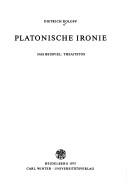
ISBN: 3533023753 3533023761 9783533023753 9783533023760 Year: 1975 Volume: n.F., Reihe 2, B Publisher: Heidelberg: Winter,
Abstract | Keywords | Export | Availability | Bookmark
 Loading...
Loading...Choose an application
- Reference Manager
- EndNote
- RefWorks (Direct export to RefWorks)
Plato --- Technique --- Irony --- Rhetoric, Ancient --- Classical languages --- Greek language --- Greek rhetoric --- Latin language --- Latin rhetoric --- Sarcasm --- Cynicism --- Rhetoric --- Satire --- Tragic, The --- Understatement --- -Aflāṭūn --- Aplaton --- Bolatu --- Platon, --- Platonas --- Platone --- Po-la-tʻu --- Pʻŭllatʻo --- Pʻŭllatʻon --- Pʻuratʻon --- Πλάτων --- אפלטון --- פלאטא --- פלאטאן --- פלאטו --- أفلاطون --- 柏拉圖 --- 플라톤 --- Rhetoric, Ancient. --- Irony. --- Technique. --- -Technique --- Ancient rhetoric --- Aflāṭūn --- Platon --- Platoon --- Платон --- プラトン
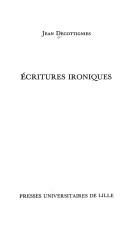
ISBN: 2859393471 2757426060 9782859393472 Year: 1988 Volume: *53 Publisher: Lille: Presses universitaires de Lille,
Abstract | Keywords | Export | Availability | Bookmark
 Loading...
Loading...Choose an application
- Reference Manager
- EndNote
- RefWorks (Direct export to RefWorks)
Symboliquement, l’opéra et la bibliothèque - la musique et la littérature - occupent le même espace où s’active l’ironie. - Un adage traditionnel a pu, fort longtemps, opposer l’air et les paroles. Nous savons, à présent, que les mots possèdent, à l’égard des choses qu’ils appréhendent, le même pouvoir ironisant que les sons. Ce livre enquête sur ce pouvoir. Figure littéraire autant que musicale, don Juan est doublement impliqué dans cet espace : saisi par l’ironie qui se dépense en lectures contestataires de sa légende, traditionnellement édifiante, il se pose lui-même en ironiste, soulevant, par son discours et son comportement, la question des valeurs, qui mobilisera, vers 1880, la critique nietzschéenne. Sur les traces du débauché, le pornographe, l’être luciférien et l’hérétique envahissent significativement la fiction contemporaine. Marque d’une esthétique différente, où la dissonance, conformément à la prophétie de l’auteur de La Naissance de la tragédie, s’impose aux dépens de la consonance. C’est dire que la musique, lors même qu’on cesse de parler d’elle, demeure présente dans toute réflexion sur l’ironie. On reconnaît ainsi le pouvoir qu’elles ont en commun de relativiser toute manifestation d’un sens déterminé, et de libérer, en contrepartie, cette profusion de simulacres, par quoi l’imaginaire d’une époque se reflète dans ses créations culturelles.
Literature --- Irony in literature. --- Literature, Modern --- Ironie dans la littérature --- Littérature moderne --- History and criticism. --- Histoire et critique --- Irony. --- Irony in literature --- Irony --- Sarcasm --- Cynicism --- Rhetoric --- Satire --- Tragic, The --- Understatement --- Ironie dans la littérature --- Littérature moderne --- musique --- littérature --- ironie
Book
ISBN: 0631187200 Year: 1978 Publisher: Oxford
Abstract | Keywords | Export | Availability | Bookmark
 Loading...
Loading...Choose an application
- Reference Manager
- EndNote
- RefWorks (Direct export to RefWorks)
Comparative literature --- Sterne, Laurence --- Arts, Modern --- -Irony --- Romanticism --- Pseudo-romanticism --- Romanticism in literature --- Aesthetics --- Fiction --- Literary movements --- Sarcasm --- Cynicism --- Rhetoric --- Satire --- Tragic, The --- Understatement --- Modern arts --- History --- -Influence --- Irony. --- Romanticism. --- History. --- Sterne, Laurence, --- Influence. --- Irony --- Yorick, --- Stʻērn, Lawrēns, --- Stern, Lourens, --- Stern, Lorens, --- Стерн, Лоренс, --- Στερν, Λωρενς, --- Iorik, --- Sterne, --- Sŭtʻŏn, Lorensŭ,
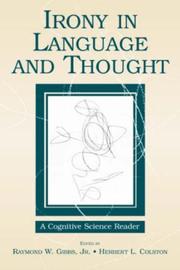
ISBN: 9780805860627 0805860622 9780805860610 0805860614 9781410616685 1410616681 Year: 2007 Publisher: New York, N.Y. Erlbaum
Abstract | Keywords | Export | Availability | Bookmark
 Loading...
Loading...Choose an application
- Reference Manager
- EndNote
- RefWorks (Direct export to RefWorks)
Psycholinguistics --- Irony. --- Ironie --- 801.56 --- 800:159.9 --- Syntaxis. Semantiek --- Taalwetenschap. Taalkunde. Linguistiek-:-Psychologie: zie ook: Psychiatrie: n-{616.89-008} en n-{615.851} --- 800:159.9 Taalwetenschap. Taalkunde. Linguistiek-:-Psychologie: zie ook: Psychiatrie: n-{616.89-008} en n-{615.851} --- 801.56 Syntaxis. Semantiek --- Irony --- Sarcasm --- Cynicism --- Rhetoric --- Satire --- Tragic, The --- Understatement
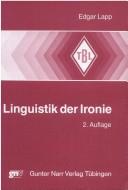
ISBN: 382334224X 9783823342243 Year: 1992 Volume: 369 Publisher: Tübingen: Narr,
Abstract | Keywords | Export | Availability | Bookmark
 Loading...
Loading...Choose an application
- Reference Manager
- EndNote
- RefWorks (Direct export to RefWorks)
Psycholinguistics --- Pragmatics --- Irony --- Speech acts (Linguistics) --- Ironie --- Psycholinguistique --- Actes de parole --- Irony. --- Linguistics. --- Linguistics --- #KVHA:Linguistiek --- #KVHA:Ironie --- Illocutionary acts (Linguistics) --- Speech act theory (Linguistics) --- Speech events (Linguistics) --- Language and languages --- Semantics (Philosophy) --- Speech --- Linguistic science --- Science of language --- Philosophy --- Sarcasm --- Cynicism --- Rhetoric --- Satire --- Tragic, The --- Understatement
| Listing 1 - 10 of 15 | << page >> |
Sort by
|

 Search
Search Feedback
Feedback About UniCat
About UniCat  Help
Help News
News